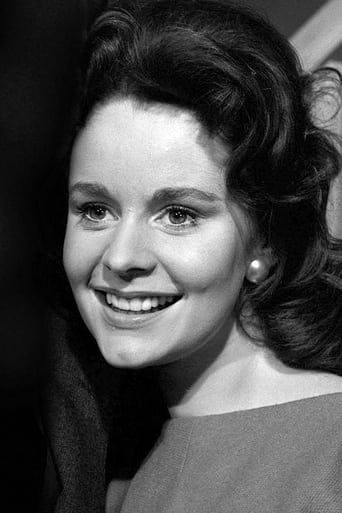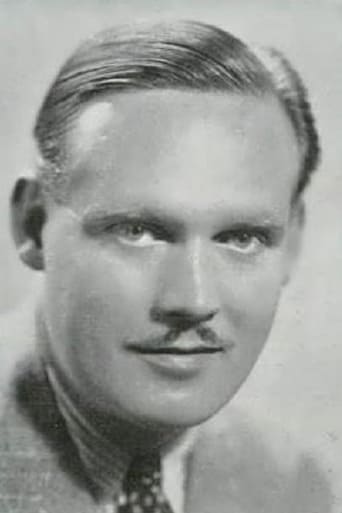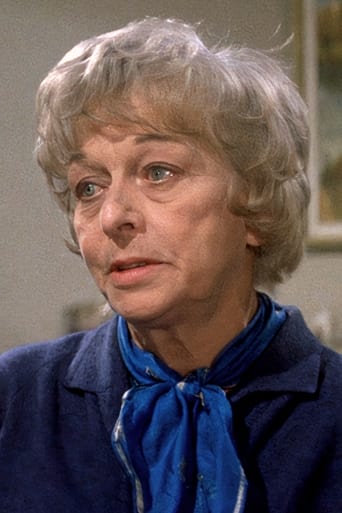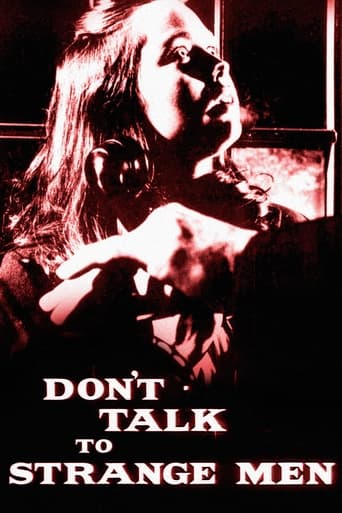
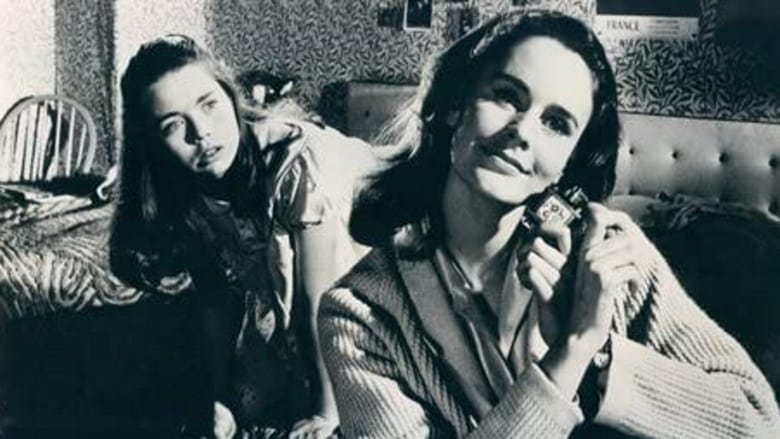
Don't Talk to Strange Men (1962)
An innocent girl is "groomed" over the telephone, and nearly becomes the victim of an attacker.
Watch Trailer
Cast


Reviews
Pretty Good
If you don't like this, we can't be friends.
Each character in this movie — down to the smallest one — is an individual rather than a type, prone to spontaneous changes of mood and sometimes amusing outbursts of pettiness or ill humor.
Actress is magnificent and exudes a hypnotic screen presence in this affecting drama.
Released as the support feature to The Loneliness of the Long Distance Runner, Don't Talk to Strange Men is a very effective creeper that is worthy of a larger audience. Clocking in at just over an hour in running time, film thrives on tension building and mood without having to spill a drop of blood. Story effectively is about a teenage girl called Jean (Christina Gregg), who whilst waiting for her bus on a secluded country lane, answers the phone ringing at the phone box situated by the stop. The voice on the phone is a charming and well spoken man, he strikes up a conversation with the intrigued girl and it's not long before the two of them are arranging to speak to each other at the same time tomorrow, and the next day Jean begins fantasising about the man, conjuring up images of the perfect male. They are destined to meet up, does she not know these are dangerous times? Where young ladies fall prey to predatory monsters The settings are perfect, Jean and her family live in some idyllic country village, the phone box and bus stop that houses the verbal "grooming" is at the junction of two pretty country lanes, and even the pub where Jean goes to help out is the kind of petite "off the beaten track" variety. It's these locations that give off a false sense of security, a normality of easy going life where nothing can go wrong But as we know all too well these days, nowhere is safe and parents constantly live in fear for their children. With that, Don't Talk to Strange Men is something of a film ahead of its time, substitute naive Jean's phone box "relationship" with that of today's Internet groomers of youngsters, and, well, you get my point I'm sure. Neatly directed by Pat Jackson (The Feminine Touch), the film is structured in such a way that we the audience get fretful as each day, and each phone conversation, passes. Where once was this attractive young lady framed by countryside and the old fashioned value of the red phone box, now is replaced by surroundings that are too quiet and a big red beacon of impending doom! It's an astute turning of the table, a testament to good writing and excellent directional pacing. And how nice to report that the ending, too, has something up its sleeve to reveal. The cast is minimal but very effective, with Gregg doing well to convince us of her love yearning naivety, Dandy Nicholls (Hue & Cry) memorable (wasn't she always?) as the wise bus conductor and Janina Faye (The Horror of Dracula) stealing the film as Jean's younger, politico activist in waiting, sister. A lesson in how to get the maximum unease from such a simple premise, Don't Talk to Strange Men comes highly recommended. 8/10
Absolute gem that apparently went out as a support to 'Loneliness of the Long distance Runner' upon release. In many ways an object lesson in how to make a movie. The performances are all good the cinematography (by Jack Cardiff) is excellent and the simple tale assuredly told thanks to a fine script. It is a tale of girls' vulnerability to 'strange men' or simply the male predator. This is all the more effective for its telling from the perspective of the two girls. Unlikely to be presented in this way today, we see the girls enthusiasm, their welcoming of the attention and in the case of the older girl, her sensing the transition to of her adulthood. Potent stuff indeed and made all the more chilling by completely believable dialogue on all sides, including the parents, and the stunning photography, particularly the night shots. Dandy Nichols is a welcome extra as the bus conductress, but this is a must see for all except those only fascinated by 'blockbusters'. Very redolent of the time but also, as others have pointed out, still pertinent today because of internet chat lines and the like.
I have always liked this film and had the chance recently to see it again as a friend taped it. It is a tale about a young girl who falls for a man she has talked to only by telephone at a remote call box. Lots of period footage of the girl and her young sister with their parents at home in their middle-class English country home. When you view the "over the call box courtship" of the nice fellow who wants to meet the young Christina Gregg you can identify with what you hear in the media today, about the way certain people court youngsters in Internet chat rooms with youngsters of today. Very thought provoking and at times charming little movie.....I wonder why they never broadcast these movies nowadays - it is still not available on DVD. I sometimes wonder what other little gems like this I am not aware of.
Pat Jackson's modest psychological thriller is no masterpiece, but is an excellent example of one of the better things to be found in the supposed quota-quickie wasteland of 50's and 60's UK cinema. It begins ominously with a pick up on a dark street. A young girl enters a car as the titles roll, to be menaced by the driver. An jump cut later and a body is discovered by some children, hidden under some straw. This discovery scene, while providing a suitably dramatic jolt, is in the event rather flat and perfunctory. Jackson's forte lies in manipulating the audience with menace (for instance leaving the assailant faceless throughout). The latest victim, so artlessly uncovered, denies the audience the chance of fabricating its own terror.How one responds to `Don't Talk..' depends largely on how one views Jean, the romantically gauche heroine (Christine Gregg, who in a short career also appeared in Corman's minor `Young Racers' (1963) as well as the limp `Cover Girl Killer' (1959)). Her accidental interception of the stranger's call, growing fascination with his voice and suave masculinity, and eventual decision to meet him alone in a dark lane, demands willing suspension of disbelief. A similar response attaches itself to Rose in `Brighton Rock' (1948), another timid `victim-to-be'. In that film response to emotional intimidation (by Pinkie) is infuriatingly compliant but gives the film much of its power. Similarly, Jean's emotional vulnerability, no matter how far her naivity stretches reason, gives the present film much of its suspense. Will she or won't she meet "the strangler"?Jean's life is neatly compartmentalised, away from any real experience of life. We see her either with her dull and doting parents, or at `The Chequers' (the pub where she baby sits), in her shared bedroom with her precocious 14 year old sister Ann, on the bus with Molly the conductor, or in the phone box waiting for or taking her calls. Most important in her life, at least as the events of the film are concerned, is the latter. At first the box seems innocuous enough and it is shot almost incidentally. Then as the film progresses and it assumes greater significance in her life, the camera begins to view it flat on until, as an ominous shape, it hovers in the background of Jean's rendezvous, almost a monolithic suitor in its own right. Finally, as a hand reaches into disconnect Ann's frantic last call, it becomes a claustrophobic chamber of terror.Ann (Jenina Faye), Jean's confidant and rapt audience for romantic fantasies, plays a crucial part in the film. With a young girl's fickleness she announces to her astonished parents that she has become a Buddhist. This interest in a religion with a strong emphasis on reincarnation, provides a neat parallel to the love-struck Jean's statement a little later. Returning from her second phone conversation, (and having `re christened' herself Samantha) she says that she feels as if she has been `born again'. Earlier Ann's condemnation of blood sports and the ensuing discussion with Mr Painter, her proposed letter of complaint to the gentry, echoes the more immediate `hunt' outside, her sister as prey. Later it is she who rushes to her sister's help, and provides the film's final irony as to do it, it emerges, she had caught a lift from a complete stranger.Jackson's direction is unobtrusive and low key, being content with some modest dollying. He avoids dramatic close ups and such tricks of the cinematographer's trade to artificially raise suspense. Instead he stages one or two remarkable long takes - partly, one assumes, to lower shooting costs - but which still stand out. One is the extended dialogue that Jean has second time around in the phone box. For long minutes Jackson's camera focuses in unblinkingly in on this innocent girl, who is unmistakeningly falling for that reassuring, civilised voice on the other end. The prolonged nature of our gaze, and the young woman's implied captivity within the barred windows of the kiosk, combine and make the audience uneasy. The conversations that ensue, carrying the implication of sexual abuse and murder, are especially unsettling to a modern audience alert to such moral panics - particularly when the younger sister is abducted at the end. Jackson's most interesting use of the long take occurs as Jean rushes to leave The Chequers to make her next phone rendezvous. He shoots a long minute or two from a viewpoint just outside of the front doorlooking into the hall. Jean, panicking to leave on time, rushes to and fro. Another director might have cut away from Jean's nervous impatience. But by letting Jean dart around the narrow hallway at length, Jackson make a virtue out of visual economy. This extended shot creates suspense more naturally than any editing could do. And through all this nervous bustling Ron, the leisurely landlord, asks for things while remaining out of our sight - in effect, just another demanding, disembodied, voice in Jean's life.So Jean goes off to her final rendezvous. The climactic scenes are less effective, baring signs of a rushed wrap-up (including a very unimpressive day-for-night match during Ron's struggle with the abductor). In the build up to the denouement, Jackson shows Ann film watching having been sent off to the cinema by Jean to create an alibi for her sister's liaison. Aptly, Ann is watching a suspenseful sequence on the screen, one which she cannot enjoy while thinking of her sister's imminent danger (to which she shortly rushes off to thwart). There's a neat mirror reference here, back to the audience's own contemplation of unfolding events.All in all, Jackson's work is a pleasant surprise which makes one regret he was not able to work with larger budgets. Rarely seen, `Don't Speak to Strange Men' is nothing to keep quiet about.


